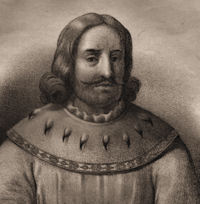Lent: March 2nd
Saturday of the Second Week of Lent
Other Commemorations: Bl. Charles the Good, Martyr (RM)
» Enjoy our Liturgical Seasons series of e-books!
The Roman Martyrology commemorates Blessed Charles the Good (1083-1127), the Danish prince, son of the holy King Canuto IV, gained the crown of the Count of Flanders from his maternal lineage. After an initial brief interval, his reign was marked by peace and justice. Dedicated to the defense and aid of the poor and weak, he was killed by soldiers that he had tried to pacify. Leo III officially beatified him in 1882 and the new Roman Martyrology commemorates the anniversary of his martyrdom.
Meditation on the Liturgy
The story of the Prodigal Son is repeated again today. It is the history of the Church; it is the history of our own desertion. In this Gospel, we are given an urgent call to repentance and conversion. "Father, I have sinned." Penance alone can save us. Our Father welcomes us with mercy. The sin and its eternal punishment are forgiven; the good works which we did before sin and the merits which we lost through sin are revived. The Father receives us again as His children and celebrates a joyful banquet with us at Holy Communion.
In the story of each human life, God's mercy stands on one side and the unfaithfulness of man on the other. Will God have to cast us off as He did the people of Israel? Have we not fully deserved it? Sometimes it appears that God wishes to allow our faithless generation to go its own way. If He does, it will merit a well-deserved punishment.
What can save us from rejection? Only penance, self-examination, and conversion. "Be converted to Me with all your heart, in fasting and in weeping and in mourning" (Joel 2:12).
—Excerpted from The Light of the World by Benedict Baur, O.S.B.
Highlights and Things to Do:
- The parable of the Prodigal Son or The Loving Father in today's Gospel are very important for your children to know. The well-known Catechesis of the Good Shepherd for children was developed by Sofia Cavalletti, a Roman Catholic Hebrew scholar who spent 30 years researching the religious development of children, and Gianna Gobbi, an educator who was trained by Maria Montessori. Through her observation of children's responses to different religious themes, Cavalletti found that an overwhelming number of younger children responded especially well to depictions of Christ as the Good Shepherd and as a Loving and Forgiving Father. Find a local atrium or learn more through Sofia's and Gianna's writings.
Blessed Charles the Good
Count Charles of Flanders, was called "the good" by the people of his kingdom. They named him for what they found him to truly be. He was the son of St. Canute, king of Denmark. Charles was just five years old when his father was murdered in 1086. When Charles grew up, he married a good young woman named Margaret. Charles was a mild and fair ruler. The people trusted him and his laws. He tried to be an example of what he expected the people to be.
Some nobles accused Charles of unjustly favoring the poor over the rich. He answered kindly, "It is because I am so aware of the needs of the poor and the pride of the rich." The poor of his realm were fed daily at his castles.
Charles ordered the abundant planting of crops so that the people would have plenty to eat at reasonable prices. Some wealthy men tried to hoard grain to sell at very high prices. Charles the Good found out and forced them to sell immediately and at fair prices. An influential father and his sons had been reprimanded by Charles for their violent tactics. They joined the little group of enemies who now wanted to kill him.
The count walked every morning barefoot to Mass and arrived early at the Church of St. Donatian. He did this in a spirit of penance. He longed to deepen his own spiritual life with God. His enemies knew that he walked to church and also that he prayed often alone before Mass. Many people who loved Charles feared for his life. They warned him that his walks to St. Donatian could lead to his death. He replied, "We are always in the middle of dangers, but we belong to God." One morning, as he prayed alone before the statue of Mary, his attackers killed him. Charles was martyred in 1127.
>—Excerpted from Holy Spirit Interactive
Patronage: counts; Crusaders; diocese of Burges, Belgium
Symbols and Representation: nobleman with a purse and a sword; depicted after his martyrdom in the cathedral; sword
Highlights and Things to Do:
- Read more about Bl. Charles:
- His remains are in the Sint-Salvatorskathedraal or Saint-Salvator Cathedral of Bruges, Flanders, in present-day Belgium.
 Saturday of the Second Week of Lent
Saturday of the Second Week of Lent
Station with Santi Marcellino e Pietro al Laterano (Saints Marcellinus and Peter):
The Station is in the church of Sts. Peter and Marcellinus, two celebrated martyrs of Rome under the persecution of Diocletian. Their relics were brought to the church in 1256, and the church was restored the same year on order from Pope Alexander IV. Santi Marcellino e Pietro al Laterano is a Roman catholic parish on the Via Merulana at the intersection with via Labicana. Their feast day is June 2..
For more on Santi Marcellino e Pietro al Laterano, see:
For further information on the Station Churches, see The Stational Church.






